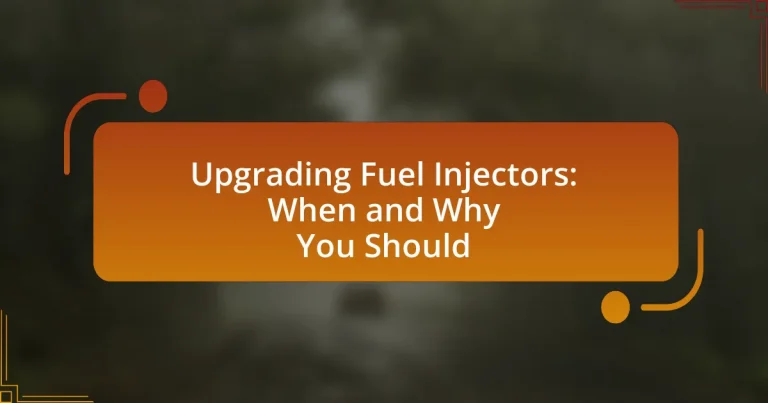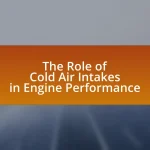Fuel injectors are critical components in internal combustion engines, responsible for delivering fuel into the combustion chamber with precision. Upgrading fuel injectors can significantly enhance engine performance by improving fuel atomization, increasing flow rates, and supporting higher horsepower outputs, especially in modified vehicles. The article explores the functionality of fuel injectors, the signs indicating the need for an upgrade, and the benefits of enhanced performance, including improved fuel efficiency and reduced emissions. It also discusses key considerations for selecting and installing upgraded injectors, as well as maintenance practices to ensure optimal performance and longevity.

What are Fuel Injectors and Why Upgrade Them?
Fuel injectors are precision devices in an internal combustion engine that deliver fuel into the combustion chamber in a controlled manner. Upgrading fuel injectors can enhance engine performance by improving fuel atomization, increasing fuel flow rates, and supporting higher horsepower outputs, particularly in modified or high-performance vehicles. For instance, vehicles with turbochargers or superchargers often require upgraded injectors to meet the increased fuel demands, ensuring optimal combustion and preventing engine knock.
How do fuel injectors function in an engine?
Fuel injectors function in an engine by precisely delivering fuel into the combustion chamber at the right moment and in the correct amount. They utilize an electromagnetic solenoid to open and close a nozzle, allowing fuel to spray into the intake manifold or directly into the combustion chamber. This process is controlled by the engine control unit (ECU), which determines the optimal fuel delivery based on various parameters such as engine speed, load, and temperature. The accurate atomization of fuel provided by injectors enhances combustion efficiency, leading to improved engine performance and reduced emissions.
What are the key components of a fuel injector?
The key components of a fuel injector include the nozzle, solenoid, fuel inlet, and body. The nozzle atomizes the fuel for optimal combustion, while the solenoid controls the opening and closing of the injector, allowing precise fuel delivery. The fuel inlet connects the injector to the fuel supply, and the body houses all components, ensuring structural integrity and proper alignment. These components work together to deliver the correct amount of fuel to the engine, which is critical for efficient performance and emissions control.
How does fuel injector performance impact engine efficiency?
Fuel injector performance directly impacts engine efficiency by determining the accuracy and consistency of fuel delivery to the combustion chamber. High-performance fuel injectors provide precise fuel atomization and optimal spray patterns, which enhance combustion efficiency and power output. Studies show that engines with well-functioning injectors can achieve up to 15% better fuel economy compared to those with malfunctioning injectors, as they ensure the correct air-fuel mixture for complete combustion. This efficiency translates to reduced emissions and improved overall engine performance, validating the critical role of fuel injectors in engine efficiency.
What signs indicate that fuel injectors need upgrading?
Signs that indicate fuel injectors need upgrading include poor engine performance, decreased fuel efficiency, rough idling, and increased emissions. Poor engine performance manifests as sluggish acceleration or stalling, which can occur when injectors fail to deliver the correct fuel amount. Decreased fuel efficiency is evident when fuel consumption rises without a corresponding increase in driving distance. Rough idling often results from uneven fuel delivery, causing the engine to shake or vibrate. Increased emissions can be detected through a failing emissions test, as malfunctioning injectors may lead to incomplete combustion. These signs collectively suggest that upgrading fuel injectors is necessary to restore optimal engine function and efficiency.
How can poor fuel economy signal the need for an upgrade?
Poor fuel economy can signal the need for an upgrade by indicating that the vehicle’s fuel injectors are not functioning efficiently. Inefficient fuel injectors can lead to incomplete combustion, resulting in higher fuel consumption and lower mileage. According to the U.S. Department of Energy, a vehicle with a malfunctioning fuel injector can experience a decrease in fuel efficiency by as much as 25%. Upgrading to high-performance fuel injectors can restore optimal fuel delivery, improve combustion efficiency, and enhance overall vehicle performance, ultimately leading to better fuel economy.
What symptoms of engine misfires suggest fuel injector issues?
Symptoms of engine misfires that suggest fuel injector issues include rough idling, decreased engine performance, and poor fuel economy. Rough idling occurs when the engine struggles to maintain a steady RPM, indicating that fuel delivery may be inconsistent due to faulty injectors. Decreased engine performance manifests as hesitation or stalling during acceleration, which can result from inadequate fuel supply. Poor fuel economy is often a consequence of inefficient fuel atomization, leading to excessive fuel consumption. These symptoms collectively indicate that the fuel injectors may not be functioning properly, necessitating inspection or replacement.
Why is upgrading fuel injectors beneficial for performance?
Upgrading fuel injectors is beneficial for performance because it enhances the engine’s fuel delivery efficiency, allowing for better combustion and increased power output. Improved fuel injectors can provide a more precise spray pattern and higher flow rates, which are essential for optimizing air-fuel mixtures, especially in modified or high-performance engines. Research indicates that vehicles with upgraded injectors can experience significant gains in horsepower and torque, as they can better meet the demands of increased airflow from performance modifications such as turbochargers or superchargers.
How do upgraded fuel injectors enhance horsepower and torque?
Upgraded fuel injectors enhance horsepower and torque by increasing the volume and precision of fuel delivery to the engine. This improvement allows for a more optimal air-fuel mixture, which leads to more efficient combustion. When fuel injectors are upgraded, they can deliver fuel at higher pressures and flow rates, enabling the engine to produce more power. For example, a study by the Society of Automotive Engineers found that vehicles with upgraded fuel injectors experienced a measurable increase in horsepower and torque due to improved fuel atomization and combustion efficiency.
What role do fuel injectors play in optimizing fuel delivery?
Fuel injectors play a crucial role in optimizing fuel delivery by precisely controlling the amount of fuel injected into the engine’s combustion chamber. This precision ensures that the air-fuel mixture is optimal for combustion efficiency, which enhances engine performance and fuel economy. Studies show that modern fuel injectors can deliver fuel in a fine mist, improving atomization and combustion, leading to reduced emissions and better throttle response. For instance, vehicles equipped with multi-port fuel injection systems can achieve better fuel distribution compared to older carbureted systems, demonstrating the effectiveness of fuel injectors in optimizing fuel delivery.

When Should You Consider Upgrading Fuel Injectors?
You should consider upgrading fuel injectors when you increase your engine’s horsepower or torque beyond the factory specifications. Upgrading fuel injectors ensures that the engine receives the necessary fuel flow to match the increased air intake, which is crucial for optimal performance. For instance, if you install a turbocharger or supercharger, the demand for fuel increases significantly, necessitating larger or more efficient injectors to prevent lean conditions that can lead to engine damage. Additionally, if you experience poor fuel economy or engine misfires, these can be indicators that your current injectors are not functioning effectively, warranting an upgrade.
What factors should influence the timing of an upgrade?
The timing of an upgrade should be influenced by the performance needs of the vehicle, the condition of existing fuel injectors, and advancements in technology. Performance needs dictate when an upgrade is necessary, especially if the vehicle is modified for higher power outputs, which may require more efficient injectors. The condition of existing fuel injectors is critical; if they show signs of wear, clogging, or decreased efficiency, an upgrade is warranted to maintain optimal engine performance. Additionally, advancements in fuel injector technology, such as improved spray patterns and fuel atomization, can enhance engine efficiency and emissions, making it beneficial to upgrade when new, superior options become available.
How does engine modification affect the need for upgraded injectors?
Engine modification typically increases the need for upgraded injectors due to enhanced fuel and air requirements. When an engine is modified, such as through turbocharging or increasing displacement, it often demands more fuel to maintain optimal performance and prevent lean conditions. Upgraded injectors provide a higher flow rate, ensuring that the engine receives sufficient fuel to match the increased air intake, which is crucial for maintaining power and efficiency. For instance, a study by the Society of Automotive Engineers indicates that modified engines can require up to 30% more fuel, necessitating the use of injectors that can accommodate this increased demand.
What maintenance schedules should prompt an injector upgrade?
Injector upgrades should be prompted by maintenance schedules that include regular inspections at intervals of 30,000 to 50,000 miles, or when fuel efficiency drops by more than 10%. These schedules are critical as they help identify wear and tear on injectors, which can lead to poor engine performance and increased emissions. Additionally, if a vehicle experiences rough idling, misfires, or decreased power, these symptoms indicate that an injector upgrade may be necessary. Regular maintenance checks, including fuel system cleaning and injector testing, can reveal the need for an upgrade to maintain optimal engine function and efficiency.
What are the potential risks of delaying an upgrade?
Delaying an upgrade of fuel injectors can lead to several potential risks, including decreased engine performance, increased fuel consumption, and potential engine damage. As fuel injectors age, they may become clogged or fail to deliver the correct amount of fuel, resulting in inefficient combustion. This inefficiency can cause the engine to work harder, leading to higher fuel consumption and reduced power output. Furthermore, prolonged neglect of injector upgrades can result in more severe engine issues, such as misfires or damage to other components, which can be costly to repair. Regular maintenance and timely upgrades are essential to ensure optimal engine function and longevity.
How can worn injectors lead to engine damage over time?
Worn injectors can lead to engine damage over time by causing improper fuel atomization and delivery, which results in incomplete combustion. This incomplete combustion can lead to carbon buildup on engine components, increased exhaust emissions, and potential overheating. Additionally, worn injectors may cause fuel to leak, leading to dilution of engine oil and reduced lubrication, which can accelerate wear on engine parts. Studies indicate that maintaining optimal fuel injector performance is crucial for engine longevity, as even minor inefficiencies can lead to significant mechanical issues over time.
What are the long-term costs associated with neglecting fuel injector upgrades?
Neglecting fuel injector upgrades can lead to significant long-term costs, including decreased fuel efficiency, increased emissions, and potential engine damage. Over time, worn or inefficient fuel injectors can cause the engine to consume more fuel, resulting in higher fuel expenses. According to the U.S. Department of Energy, a vehicle with a malfunctioning fuel injector can experience a fuel economy drop of up to 30%. Additionally, failing to upgrade can lead to increased emissions, which may result in costly fines or repairs to meet environmental regulations. Furthermore, prolonged neglect can cause engine knocking or misfires, leading to expensive repairs or even engine replacement, which can cost thousands of dollars.

What to Consider When Upgrading Fuel Injectors?
When upgrading fuel injectors, consider the injector flow rate, compatibility with your engine, and the intended performance goals. The flow rate must match or exceed the engine’s fuel requirements to ensure optimal performance, as insufficient flow can lead to lean conditions and engine damage. Compatibility is crucial; injectors must fit the specific make and model of the vehicle to function correctly. Additionally, performance goals, such as increased horsepower or improved fuel efficiency, should guide the selection process, as different injectors are designed for various applications.
How do you choose the right fuel injectors for your vehicle?
To choose the right fuel injectors for your vehicle, first identify the specific requirements based on your engine type, performance goals, and compatibility with existing components. Selecting fuel injectors involves considering factors such as flow rate, injector size, and the vehicle’s fuel system specifications. For instance, if you are upgrading for increased horsepower, you may need injectors with a higher flow rate to meet the engine’s fuel demands. Additionally, ensure that the injectors are compatible with your vehicle’s make and model, as using mismatched injectors can lead to performance issues or engine damage.
What specifications should you look for in upgraded injectors?
When upgrading fuel injectors, you should look for specifications such as flow rate, spray pattern, and resistance. The flow rate, measured in pounds per hour (lb/hr) or cubic centimeters per minute (cc/min), indicates how much fuel the injector can deliver; higher flow rates are essential for increased power demands. The spray pattern affects fuel atomization and combustion efficiency, with a fine mist being preferable for optimal performance. Additionally, injector resistance, typically measured in ohms, should match your vehicle’s electrical system to ensure compatibility and prevent damage. These specifications are critical for achieving the desired performance and efficiency in upgraded fuel injectors.
How does injector size impact performance and compatibility?
Injector size directly impacts engine performance and compatibility by determining the volume of fuel delivered to the combustion chamber. Larger injectors can provide more fuel, which is essential for high-performance applications where increased power output is desired. However, if the injector size exceeds the engine’s requirements, it can lead to poor fuel atomization, resulting in incomplete combustion and reduced efficiency.
Compatibility is affected as well; larger injectors may not function properly with stock engine management systems, potentially causing issues such as rough idling or engine misfires. Proper tuning is necessary to ensure that the fuel delivery matches the engine’s air intake, maintaining optimal performance and efficiency. Therefore, selecting the appropriate injector size is crucial for achieving the desired balance between performance enhancement and system compatibility.
What installation considerations should you keep in mind?
When upgrading fuel injectors, it is crucial to consider compatibility with the vehicle’s engine and fuel system. Ensuring that the new injectors match the specifications of the engine, such as flow rate and resistance, is essential for optimal performance. Additionally, proper installation techniques, including the use of new seals and gaskets, are necessary to prevent leaks and ensure a secure fit. It is also important to check for any required tuning adjustments to the engine management system, as improper tuning can lead to performance issues or engine damage.
How can professional installation affect injector performance?
Professional installation can significantly enhance injector performance by ensuring precise alignment, optimal sealing, and correct calibration. When fuel injectors are installed by professionals, they utilize specialized tools and techniques that minimize the risk of leaks and misalignment, which can lead to inefficient fuel delivery and engine performance issues. Studies have shown that properly installed injectors can improve fuel atomization and combustion efficiency, resulting in better engine response and fuel economy. For instance, a report from the Society of Automotive Engineers indicates that injector performance can be compromised by improper installation, leading to a decrease in horsepower and increased emissions.
What tools and skills are necessary for a DIY installation?
For a DIY installation of fuel injectors, essential tools include a socket set, torque wrench, fuel line disconnect tool, and screwdrivers. Skills necessary for this task encompass mechanical aptitude, the ability to follow technical instructions, and basic automotive knowledge. These tools enable precise removal and installation of injectors, while the skills ensure the process is executed safely and effectively, minimizing the risk of damage to the vehicle’s engine system.
What are the best practices for maintaining upgraded fuel injectors?
The best practices for maintaining upgraded fuel injectors include regular cleaning, ensuring proper fuel quality, and monitoring injector performance. Regular cleaning prevents carbon buildup, which can hinder injector function; using high-quality fuel minimizes contaminants that can damage injectors; and monitoring performance through diagnostics helps identify issues early, ensuring optimal operation. These practices are essential as studies show that maintaining fuel injectors can improve engine efficiency and longevity, with clean injectors contributing to better fuel atomization and combustion.
How often should you clean or service your fuel injectors?
Fuel injectors should be cleaned or serviced every 30,000 to 60,000 miles, depending on the vehicle and fuel quality. Regular maintenance helps prevent clogging and ensures optimal engine performance. Studies indicate that neglecting fuel injector maintenance can lead to decreased fuel efficiency and increased emissions, reinforcing the importance of adhering to this service interval.
What fuel types are recommended for optimal injector performance?
Premium gasoline is recommended for optimal injector performance due to its higher octane rating, which helps prevent knocking and allows for more efficient combustion. Additionally, fuels with detergents, such as Top Tier gasoline, can help keep injectors clean and functioning properly. Studies have shown that using high-quality fuel can lead to improved engine performance and fuel efficiency, as cleaner injectors contribute to better atomization and combustion.


